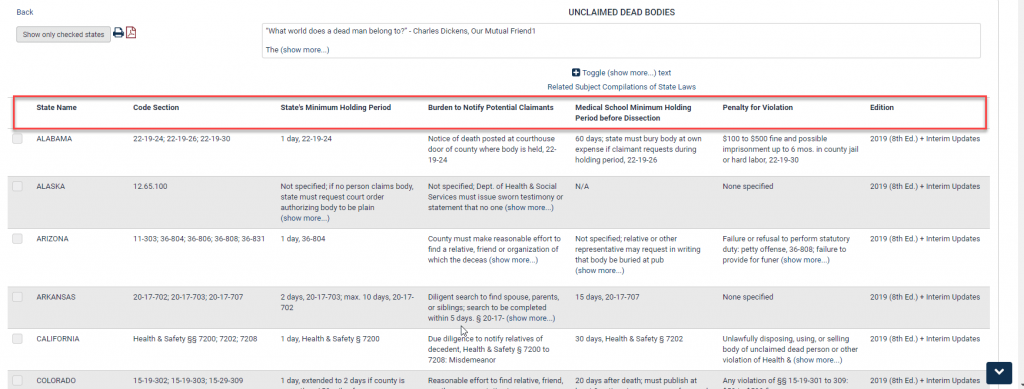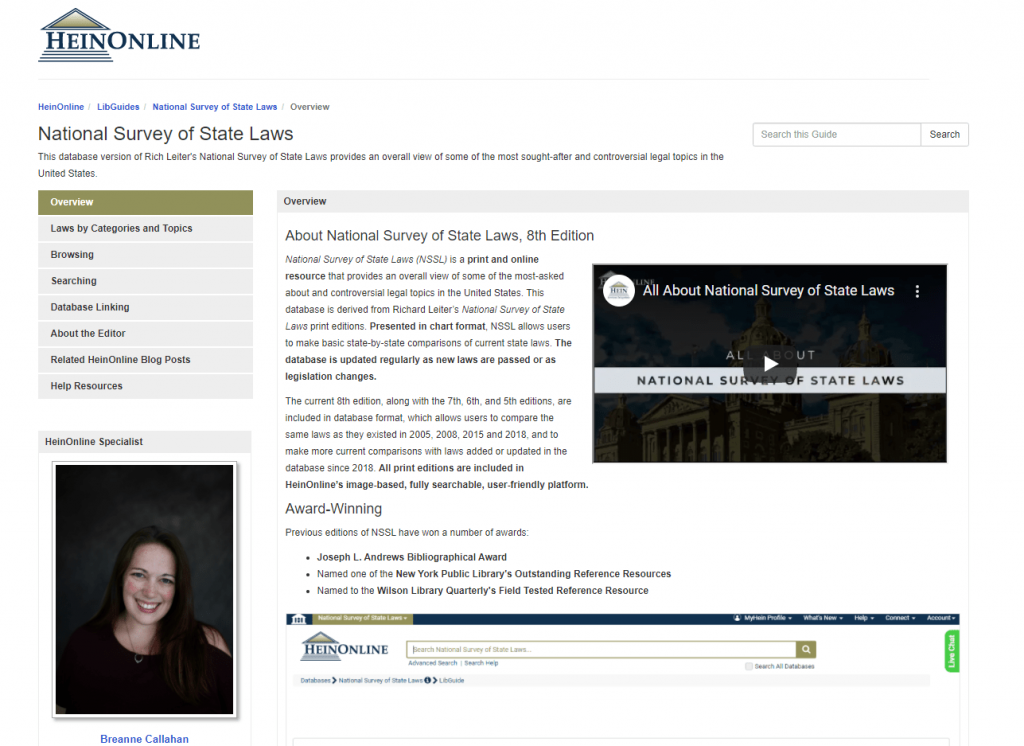National Survey of State Laws (NSSL) is a print and online resource that provides an overall view of some of the most-asked-about and controversial legal topics in the United States. The database is derived from Richard Leiter’s National Survey of State Laws print editions. Presented in an interactive chart format, NSSL allows users to make basic state-by-state comparisons of current state laws. The database is updated regularly as new laws are passed or updated.
The current 8th edition, along with the 7th, 6th, and 5th editions are available in HeinOnline’s image-based, fully searchable, user-friendly database format. Users can explore the database to compare the same laws as they existed in 2005, 2008, 2015, and 2018, and to make more current comparisons with laws added or updated in the database since 2018.
New Chapter Available
Unclaimed Dead Bodies
The medical community has shared a questionable history with unclaimed bodies. Driven by a constant need for bodies for use in medical research and advancement, medical centers and universities historically have accepted the unclaimed bodies of marginalized people—including non-white, poor, mentally disabled, elderly, non-heterosexual, and incarcerated peoples.

Each year in the United States, an estimated 40,000 bodies go unclaimed after their death. While these individuals may go unclaimed for a variety of reasons, one of the largest barriers to being claimed is the expense that accompanies death. Generally, if no one comes forward to collect a body, the body is transported to the nearest medical school. While the idea of involuntary donation to science may be a bit unnerving, cadavers aid in training new generations of doctors and surgeons, and most importantly, they advance innovation in medical research that saves the living.
Because there is no uniform system in place in the United States to deal with unclaimed remains, each state has adopted its own protocol. This new chapter compares and contrasts this legislation, with headers including minimum holding period, burden to notify potential claimants, medical school minimum holding period before dissection, and penalty for violation.

Recently Updated Chapters
Animal Welfare
Traditionally, animals have been treated as property, not as beings or persons capable of ownership of property or of possessing the right to be free of abuse or harm. However, in modern times, domesticated animals have achieved enhanced roles in the lives of their owners, with companion animals becoming family members.
Animal law is a rapidly growing area of the law. Law schools are teaching courses in animal law and states are strengthening penalties for crimes against animals. Several states are placing a greater emphasis on the protection of companion animals. As such, this updated chapter is devoted largely to the discussion of companion animals; specifically, it discusses honorary or “pet” trusts, animal abuse, and animal fighting.
Antitrust
Antitrust violations are “crimes” committed by business entities that injure both competing businesses and the consumer by artificially inflating or fixing prices. Antitrust laws came into national prominence in the late 19th century with the rise of the giant industrial monopolies. Through the exercise of its power to regulate interstate commerce, Congress enacted the most sweeping of antitrust regulations in the Sherman Antitrust Act.
Because of the great size of the businesses engaged in antitrust or anti-competitive practices as well, the federal government has taken the lead in enforcing against these types of unfair business practices. This newly updated chapter discusses the different ways antitrust statutes are enforced in each state.
Freedom of Information Acts
For centuries, the common law has recognized the public’s right to access public records. Access to public records has been an important component of participatory democracy and a judiciary accountable for its decisions. However, this important feature of an open government can also run afoul of another important aspect of our democracy: the right to privacy.
In 1966, the United States Congress passed the Freedom of Information Act (FOIA), for the first time creating a statutory right of public access to public records. Since that time, every state has passed its own version of FOIA, and this recently updated chapter compares distinct aspects of them.
Legal Ages
The law only recognizes as legal the acts of persons who possess the capacity to form the proper intent to perform the particular acts. The age at which someone is considered an adult is known as the “age of majority” and is usually 18 years old. The variation of age limits for different activities, such as marrying, voting, or consuming alcohol, illustrates the values a society places on certain types of activities and how a society values individual responsibility and accountability.
This chapter, newly updated, examines the differences among states in legal ages for acts such as emancipation, contracts, ability to sue, and consent to medical treatment.
Personal Income Tax
If you live in Alaska, Florida, Nevada, South Dakota, Tennessee, Texas, Washington, or Wyoming, you may not be aware that most of the rest of the country has to file two tax returns every April. Every other state, aside from these lucky eight, requires income tax over and above federal taxes from its citizens.
The chart in this updated chapter deals only with the general principles of state personal income tax. The tax tables are accurate but are very much consolidated and generalized in order to give the reader a broad basis for comparison.
Explore the National Survey of State Laws
Want to dive deeper into everything you can discover within the National Survey of State Laws? Our dedicated LibGuide walks you through all that this unique database has to offer and how you can best utilize it. Then, reach out to our team for a quote so you can get started with your research!




